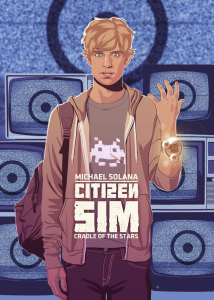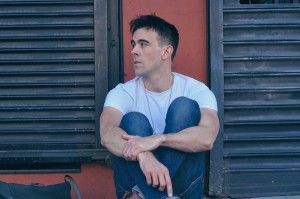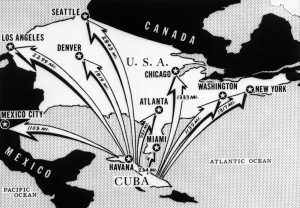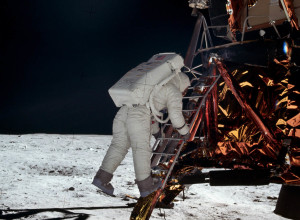“When I was in college I would talk a lot about Mars.”
When talking to Michael Solana about science fiction and human progress, it becomes quickly apparent that one article about his views on the future are simply not enough to cover everything. Fortunately, he is presenting Science Fiction IRL and Our Road Map to Utopia at SXSWi.

Solana’s sci-fi novel Citizen Sim
Storytelling has been many things to all of us. It is a respite from the day to day, a recounting of sorrowful or joyous events, and it can be the stuff of dreams. Dreams certainly do inspire us to greater action. This inspiration has led to some of the most important inventions in the 20th century.
“Pretty much every piece of technology existed in fiction first,” Solana said.
The cell phone was on Star Trek, the submarine was in 20,000 Leagues Under the Sea, and Arthur C. Clarke thought of telecommunications before the first satellite. Are the storytellers the real inventors? Michael Solana looks to answer this and more. If they are, then another big question is what kind of stories do we want writers telling? Solana’s answer is something that will inspire us to a better world.
“What the dream would be in this post scarcity world, and I’ll talk about what stories will help get us there,” Solana said.
To help bring this world a little closer, he is working with an investment firm called the Founders Fund, named in reference to the Asimov Foundation series.
“It’s a venture capital fund in Silicon Valley,” Solana said. “We are dedicated to find highly scalable technology, and we are very interested in really radical tech stuff like transhumanism.”
For Solana the greatest tools are our stories, whether they are words or even a simple image of some distant corner of the cosmos.
“I think Hubble is one of the most important things that has ever happened to humanity,” Solana said. “Hopefully we will look back on it as something that helps move forward in the exploration of space.”
Storytelling is a powerful force in our culture, and now in a world where science dominates every facet of our lives, the genre of science fiction has become more relevant than ever.
“What we are able to do with stories is abstract lots of complicated thinks, from moral direction, to ideas of where we want to be,” Solana said. “We tell what should and should not be done. In science fiction we can tell a story about the world we want to be in.”
In the digital age, an age of a changing climate, where the old weapons that still could destroy all life on Earth exist, and where people still starve, it is easy to see how we might resent, just a little, the very thing that has given us food to feed more than we thought possible, cured disease and sent us to space.
“You’re not supposed to be too proud,” Solana said. “Technology and science are like our Tower of Babel.”
If we don’t use it right, it could all come crashing down on us. We learned that during the 13 very long days of the Cuban Missile Crisis in October of 1963.
We also learned that we can bring peace and hope from mankind to new worlds in 1969.
Stories real or imagined have power. Couple this with our inventive nature, science, and a little bit of ambitious forward thinking, and you have sci-fi, a genre where a storyteller can use science and push it just a little further past the known and make a comment about the human condition.
“The whole point of science fiction is to show us something that we could be,” Solana said.
Rather than show what shouldn’t be, sci-fi can show an uplifting world worth preserving from the dangers we face, both from ourselves and forces once thought to be out of our control.
“I believe that it’s happening in science fiction and I believe that it’s powerful.”



